The Revolution in Public and Subsidized Housing
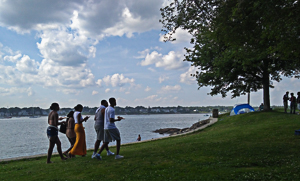
The Revolution Has Begun
Together we are making a revolution, fighting for our rights by using the traditional systems for legislation and the administration of housing programs.
The traditional system for change is democracy: grass roots organizing; building a coalition of tenants, managers and landlords; and partnering with legislators.
We are the revolution. We will assure the rights of tenants who are elderly or disabled by making sure they have safety and justice. We partner with legislators and everyone who is willing to help.
Together we have come far, and we have more to do.
The challenge
Tenants who are targeted by mobbing---a group targets and bullies their victims---can not defend themselves, asserts Janice Harper, Ph.D., who wrote "Bullying and mobbing in group settings."
Only the landlord (the private developer or the local housing authority) has the legal obligation to protect the right of peaceful enjoyment for each tenant. Bullying and mobbing deprive the target of their right to peaceful enjoyment. See: Mass Attorney General, Advisory on Harassment
There is no effective oversight of landlords, neither the private developers of subsidized housing nor the community-based local housing authorities. They are not held accountable for assuring the rights of tenants, including the right of peaceful enjoyment, despite the fact that these rights are enshrined in law and regulations.
We tenants lack the money for legal fees and court costs needed to pursue remedies in civil court.
Where we stand
Through our efforts, including the advocacy of many tenants, we helped to establish the first state legislative commission to study ways to protect tenants from bullying, we participated in the work of the commission, and we approved the consensus report which led to the "administrative remedies" legislation presented by Senator Joan Lovely (S984) and Representative Kevin Honan (H1443).
That bill, S984 / H1443, has been reported out of the Joint Committee on Housing and has gone on to the Committee on Ways and Means. When passed, that legislation will improve the administration of housing programs, providing guidance and resources to local housing authorities and private landlords. We are proud of our part in helping to make this happen. Thank you for what you have done to achieve this victory.
The need for an ombuds office
Extensive research developed for the commission on bullying demonstrated the lack of effective protections against bullying. Some obvious remedies were proposed but rejected by the commission.
Solutions of crucial importance to the safety and well-being of tenants were not adopted by the commission. Why? Because they would meet the needs of tenants, and we were told that the commission would not support advocacy for tenants.
We continued to work with our legislative partners, Senator Joan Lovely and Representative Brad Hill, to press for legislation to meet those needs.
These remedies include:
- Tenants must have rapid access to an office that will hear complaints, investigate, protect from retaliation or further harm.
- Landlords must be held accountable for assuring the peaceful enjoyment of every tenant.
- Protections and accountability must be applied to subsidized as well as public housing tenants because our rights are those of every citizen and every tenant, regardless of the public or private administrative system.
We argued that these remedies to assure protection and accountability were an essential complement to the methods proposed in the "administrative remedies" bill, S984 / H1443.
Creating a tenant protective services ombuds program
In response to our efforts, Senator Joan B. Lovely introduced An act relative to bullying in housing (S985) establishing a new statewide independent tenant protective services ombuds program to prevent bullying of tenants.
The urgent need for protection and accountability was clearly presented by the many people who testified on April 30, 2019 before the Joint Committee on Housing of the Massachusetts legislature. See: Report: Testimony on Bullying Bills Before the Joint Committee on Housing
The Stop Bullying Coalition is continuing to press for adoption of the ombuds bill. That bill is a good basis, and it needs to be strengthened to provide effective security and safety to tenants and to hold both public and subsidized housing landlords accountable for their legal obligation to assure the right of each tenant to peaceful enjoyment.
Call to action
We call on each and every tenant and advocate to call or write your state senator and representative. Tell them why we need the ombuds bill to provide protection and to hold landlords accountable in order to assure our rights, including that of peaceful enjoyment. You can say, "please support a strong version of S985 to create an effective statewide independent tenant protective services ombuds program to prevent bullying of tenants and hold landlords accountable, and assure our safety and our right to 'peaceful enjoyment.'"
Please also support the "administrative remedies" legislation presented by Senator Joan Lovely (S984) and Representative Kevin Honan (H1443).
Please copy us on your efforts, including your zip code and the names of your legislators.
ombuds (at) StopBullyingCoalition.org Replace (at) with @
For more detailed information, write to the same email.
Documentary film on bullying
Jerry Halberstadt, Coordinator of the Stop Bullying Coalition and Mikhail Kazachkov, an advocate for human rights and an experienced film producer, are producing a documentary about bullying in public and subsidized housing, to be broadcast by Salem Access TV.
The theme of the film is that bullying can be overcome; and documents how we are progressing in advocacy.
The film examines the roles of tenants, landlords, and legislators by following a period of transition in Salem and other communities. We will show the impact of bullying from the perspective of tenants and other stakeholders and how a community tries to organize against bullying. And we will show how tenants and others can effectively advocate for legislation that will assist everyone in the housing community to prevent bullying.
Interview with Senator Joan Lovely
We are pleased to make available one of the interviews that will be incorporated selectively into the final documentary film.
On July 17, 2019, Jerry Halberstadt led a discussion with Senator Joan B. Lovely, sponsor of the current bullying bills, and a partner of the Stop Bullying Coalition. In the wide-ranging conversation, we explored the development of our partnership with Senator Lovely, her collaboration with her colleagues, and the progress of our legislative goals. The video of that interview is available here. Taking part in the conversation, which took place in the state house, were Susan Bonner, Legislative Chair, Mass Union of Public Housing Tenants, and Bonny Zeh. Bonny is a tenant in a Federal-subsidized development for elderly and disabled owned and operated by Somerville public housing; co-founder of the coalition; and editor of a valuable online collection of resources.
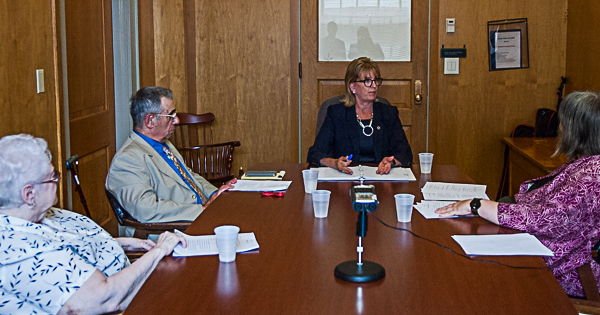
Interview with Salem Mayor Kim Driscoll
On June 28, 2019, I was privileged to interview Salem Mayor Driscoll about her ideas and perspectives on ways to prevent bullying and develop a healthy community life. See transcript online.
Solidarity with the Black Picnic in Salem Willows
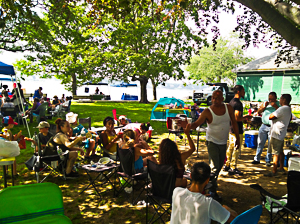
On July 20, 2019, the third Saturday in July, I was honored to participate in the parade and picnic celebrating the 278th anniversary of the first gathering of 26 black slaves on the banks of the Saugus River in Lynn. That gathering was the first time that black people were able to hold an election for a person to lead their community. Today the march and picnic serve for information and advocacy as well as gathering together families for food and to enjoy music.
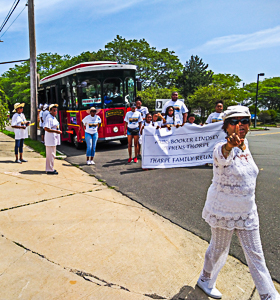
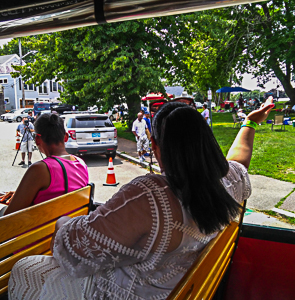
The event is organized by Doreen Wade, the President of Salem United. One of the themes is to encourage registration and voting. And in a world where racial prejudice still exists, the Black Picnic is open to all. This year it was hot and humid, but the shade and ocean breeze moderated the heat. There was a band, great food, and wonderful companionship.
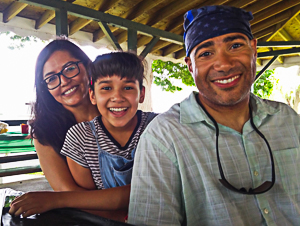

A long time ago, in 1950 I graduated from the Houghton Public School in Cambridge. It may have been the only integrated public school in the country at that time, and in that old building, sitting at wooden desks scarred by carved initials and wear, and with an inkwell in the corner (they still taught the Palmer method of penmanship!), one of the redeeming benefits of those years was knowing people who were outwardly different and learning to appreciate people for who they were.
Doreen Wade attended the same school many years later. Doreen is a great lady with energy and vision. She has worked with Senator Joan Lovely to propose legislation to make the third Saturday in July a state holiday to honor the Black Picnic. And I was there to provide information and meet people, and support Salem United.
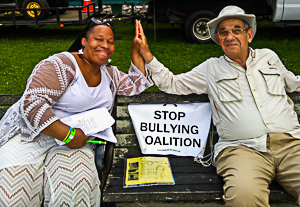

New Resources
Landlord-Tenant Rights & Responsibilities Webinar Presentation
As a part of the Attorney General’s Office continued effort to inform the public about its resources, the Community Engagement Division begun train-the-trainer model presentations. CED will provide a webinar training every month and can provide additional webinars for service organizations and agencies upon request.
This webinar will be held on Tuesday, September 10th, 2019, regarding general Landlord-Tenant Rights & Responsibilities in Massachusetts.
Across the Commonwealth of Massachusetts, thousands of residents elect to rent their homes, while thousands of others serve as landlords. When entering into a rental agreement, there are a number of issues that both landlords and tenants must consider.
This presentation will outline rental agreement considerations, as well as rules regarding types of tenancies, payments, evictions, habitable living conditions, and housing discrimination. It is important for both landlords and tenants to understand the laws and regulations that govern all aspects of rental arrangements.
Register Here: https://ltrwebinar.eventbrite.com
New guide to eviction proceedings
Greater Boston Legal Services has posted an online guide for Massachusetts tenants facing eviction. Since most tenants are not represented by an attorney in those proceedings, while a majority of landlords are represented, this guide can help to level the playing field. It is available in Spanish as well as English.
Updated resources and links
Bonnie Zeh has updated the comprehensive list of links with resources.
- Log in to post comments
